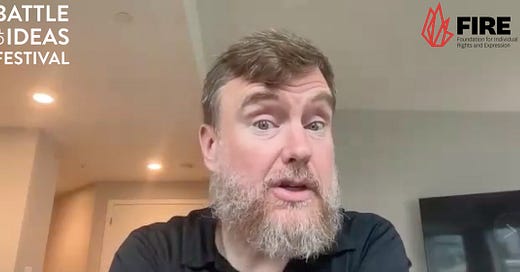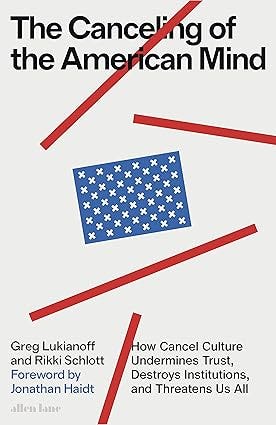Transatlantic free speech at the Battle of Ideas festival
Greg Lukianoff, CEO of the US-based Foundation for Individual Rights and Expression, joins the team on the latest Podcast of Ideas for a taster of what's to come at this year's Battle...
The Podcast of Ideas is back - with a special, pre-Battle episode. Consider this a taster of what we’ve got coming at the Battle of Ideas festival in two weeks’ time.
The free-speech wars continue to express themselves in all manner of ways. For example, it has been reported today that Cheltenham Literature Festival has told session chairs that if any speaker expresses certain views - such as being gender-critical - that the chair should emphasise that the Festival ‘does not endorse the views shared on stage’. This is disappointingly censorious. As I noted in a post on X, ‘other festivals are available’ - in other words, the Battle of Ideas festival, with our motto ‘FREE SPEECH ALLOWED’.
So, we’re really excited to be joined by Greg Lukianoff - CEO and president of the Foundation for Individual Rights and Expression - FIRE - which is proud festival partner on our Free Speech Strand at this year’s Battle of Ideas festival.
Greg is an attorney and author of Unlearning Liberty: Campus Censorship and the End of American Debate, Freedom From Speech, and FIRE’s Guide to Free Speech on Campus. He co-authored The Coddling of the American Mind: how good intentions and bad ideas are setting up a generation for failure with Jonathan Haidt and, most recently, The Canceling of the American Mind: How cancel culture undermines trust, destroys institutions, and threatens us all, co-authored with Rikki Schlott.
In The Canceling of the American Mind, Greg and Rikki explore how workplaces and universities across all domains – including science, medicine, media, academia, finance and law – have internalised a culture of fear about expressing dissenting views. Moreover, they have adopted the practice of strategically quelling speech unpopular among the elite (by which the authors effectively mean ‘the ruling class’). Meticulously documenting cancel culture as a pervasive force that has taken over American institutions, The Canceling of the American Mind points out that Britain has not been immune to cancel culture either, from the firing of Kathleen Stock and cancellation campaigns against JK Rowling to the suspension of Cambridge’s Nathan Cofnas.
Greg and his colleagues Nico Perrino and Connor Murnane are traveling over to London to join us for a day of debates at the festival. We’ve got a special Authors Live session with Greg on his new book. Plus, fans of GB News’ Free Speech Nation will also be delighted to know that he will be joining Battle friend Andrew Doyle on Free Speech Nation, recorded live at the festival. More details on those sessions further down this Substack.
In this podcast, Battle co-convenors Ella Whelan and Alastair Donald chat with Greg ahead of the festival about his new book and the differences in the free-speech battles either side of the pond. They also discuss how victories against censorship can be won - is it in the courts, on the street or in government?
If you haven’t got your tickets to the Battle of Ideas festival yet, what are you waiting for? Taking place on 19 & 20 October at Church House, Westminster, the festival will be a weekend of collective conversations that involve speakers and audience alike, ones that will really get everyone thinking. If that sounds like your cup of tea, join us - paid Substack subscribers get discounts on tickets. Upgrade your subscription and hit the button below:
We are delighted to be partnering with FIRE on a whole day of debates in our Free Speech Strand. Head to THEFIRE.ORG to find out more about what they do in the US, and read on for information about our partnered debates at this year’s Battle.
Meet the author: Greg Lukianoff on The Canceling of the American Mind
Sunday 20 October, 10:00-10:45
Building upon his groundbreaking text, The Coddling of the American Mind – which has influenced much of the understanding of the roots of cancel culture – Lukianoff articulates the dire problems present in political engagement across the English-speaking world. Should we resist the pessimism underlying ‘You Can’t Say That!’ culture, and try to figure out concrete solutions to reclaim a culture of free speech? Or are sceptics right, that free speech is too dangerous in a febrile public square – particularly online? And, as Lukianoff suggests, are the problems with cancel culture both external in our institutions and bureaucracies, and internal – with the ever-present need to check our own inclinations to cancel our adversaries and stand up to the policemen in our own heads?
SPEAKER:
Greg Lukianoff
president and CEO, Foundation for Individual Rights and Expression (FIRE)
CHAIR:
Dennis Hayes
founder and director, Academics For Academic Freedom (AFAF); author, The Death of Academic Freedom? Free speech and censorship
(Mis)information: the battle for free speech online
Sunday 20 October, 11:00-12:30
There’s no doubt that the growth of social media, online self-publishing and, now, AI, pose challenges for public discussion. It can be hard to tell what is true or false when claptrap, unfounded assertions or falsified narratives can be spread with ease online – sometimes by tinfoil-bedecked conspiracy proponents and bad-faith actors, sometimes by well-meaning, if naïve, individuals. But do the public need protection from untruths and, if so, what legal controls should there be? Is there a problem of political bias when it comes to assessing misinformation, with authorities picking and choosing which untruths they go after? How can we tackle the actual problems of misinformation, while resisting cancellations and bans? Or should we simply tolerate the free dissemination of all ideas, in order to avoid the development of a broader censorious culture?
SPEAKERS:
Timandra Harkness
journalist, writer and broadcaster; author, Technology is Not the Problem and Big Data: does size matter?; presenter, Radio 4's FutureProofing and How to DisagreeFraser Myers
deputy editor, spiked; host, the spiked podcastNico Perrino
executive vice president, Foundation for Individual Rights and Expression (FIRE)Eli Vieira
journalist; editor, Gazeta do Povo; writer, Twitter Files - BrazilDr Daniel Williams
lecturer in Philosophy, University of Sussex
CHAIR:
Alastair Donald
co-convenor, Battle of Ideas festival; convenor, Living Freedom; author, Letter on Liberty: The Scottish Question
Anti-Semitism on campus: ban it or tolerate it?
Sunday 20 October, 13:45-15:15
With ‘Gaza solidarity’ camps becoming a prominent feature of university life in the aftermath of the 7 October attacks, many worry that support for the Palestinian cause often mutates into expressions of anti-Semitism. Are increasing efforts to ban anti-Semitism on campus a threat to free debate, or an imperative for creating a civil atmosphere in universities? In terms of protests and free speech, where do the boundaries lie in terms of actions and speech that should be defended? What are the new issues that the Gaza-solidarity protests raise, compared to the campus demonstrations against the Vietnam War during the 1970s? Should anti-Semitism be banned on campus, or should it be tolerated in the belief that sunlight is the best disinfectant?
SPEAKERS:
Professor David Abulafia
professor emeritus of Mediterranean history, University of Cambridge; associate editor, History Reclaimed; president and trustee, Pharos FoundationDaniel Ben-Ami
journalist; creator, Radicalism of Fools project on rethinking anti-Semitism; author, Ferraris for All: in defence of economic progressBaroness Ruth Deech
crossbench peer, House of LordsGreg Lukianoff
president and CEO, Foundation for Individual Rights and Expression (FIRE)Edward Skidelsky
senior lecturer in Philosophy, University of Exeter
CHAIR:
Ella Whelan
co-convenor, Battle of Ideas festival; journalist; author, What Women Want
Declare your pronouns: EDI and compelled speech
Sunday 20 October, 15:45-17:00
Equality, Diversity and Inclusion (EDI, or DEI in America) measures have become an important organisational framework for governments, universities, quangos and businesses across the English-speaking world. But, for many people, these three letters (in whatever order) signify illiberalism – and a dread of being compelled to repeat EDI mantras on pain of ostracism, re-education or even job loss. What is the impact of EDI on our institutions? Do such policies promote social justice and enhance opportunities for underrepresented groups? Or are these policies playing a divisive role in public life, to the detriment of free speech and free inquiry – imposing values on students, employees and customers by compelling the majority to think and speak only in officially approved ways? Is EDI/DEI here to stay or might it DIE in the future under the weight of popular revolt?
SPEAKERS:
Dr John Armstrong
reader in financial mathematics, King’s College London; founding member, London Universities’ Council for Academic FreedomEric Kaufmann
professor of politics, University of Buckingham; advisory council member, Free Speech Union; author, Taboo: How Making Race Sacred Led to a Cultural RevolutionConnor Murnane
campus advocacy chief of staff, Foundation for Individual Rights and Expression (FIRE)Dr Joanna Williams
author, How Woke Won and Women vs Feminism
CHAIR:
Jacob Reynolds
head of policy, MCC Brussels; associate fellow, Academy of Ideas
Does the UK need a First Amendment?
Sunday 20 October, 17:15-18:30
In the US, where the culture wars reign supreme, from the public square to the workplace to universities, many individuals have been judged to have crossed the line or fallen foul of what is judged permissible. Nonetheless, the First Amendment confers on free speech the status of a ‘primary value’, with no categorical exceptions for hate speech and false or misleading speech – areas where free speech has regularly been under attack in Britain. Should a society looking to secure free speech pursue this through legal enforcement? Or should the priority be to build a free-speech culture that supports winning political arguments on an ongoing basis? Do we already fall back on the law too much to resolve issues that should be dealt with through political debate? Or would a First Amendment-style act provide a benchmark for free speech that would offer necessary protections in the face of competing priorities?
SPEAKERS:
Nico Perrino
executive vice president, Foundation for Individual Rights and Expression (FIRE)Tom Slater
editor, spiked; co-host, spiked podcast and Last OrdersThomas Walker-Werth
associate editor, The Objective Standard; author, Reason for Living: A rational approach to living your best life (forthcoming)Toby Young
general secretary, Free Speech Union; author, How to Lose Friends & Alienate People; associate editor, Spectator
CHAIR:
Claire Fox
director, Academy of Ideas; independent peer, House of Lords; author, I STILL Find That Offensive!








